西奥多 罗斯福——勤奋生活论Theodore Roosevelt-The Strenuous Life
- 格式:doc
- 大小:31.50 KB
- 文档页数:3
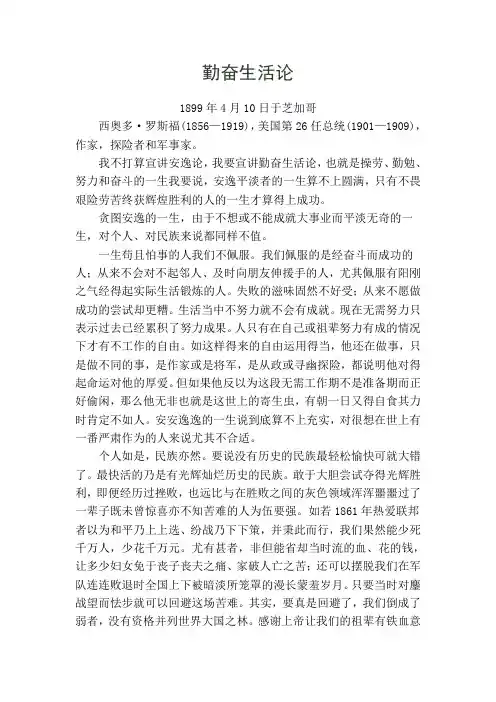
勤奋生活论1899年4月10日于芝加哥西奥多·罗斯福(1856—1919),美国第26任总统(1901—1909),作家,探险者和军事家。
我不打算宣讲安逸论,我要宣讲勤奋生活论,也就是操劳、勤勉、努力和奋斗的一生我要说,安逸平淡者的一生算不上圆满,只有不畏艰险劳苦终获辉煌胜利的人的一生才算得上成功。
贪图安逸的一生,由于不想或不能成就大事业而平淡无奇的一生,对个人、对民族来说都同样不值。
一生苟且怕事的人我们不佩服。
我们佩服的是经奋斗而成功的人;从来不会对不起邻人、及时向朋友伸援手的人,尤其佩服有阳刚之气经得起实际生活锻炼的人。
失败的滋味固然不好受;从来不愿做成功的尝试却更糟。
生活当中不努力就不会有成就。
现在无需努力只表示过去已经累积了努力成果。
人只有在自己或祖辈努力有成的情况下才有不工作的自由。
如这样得来的自由运用得当,他还在做事,只是做不同的事,是作家或是将军,是从政或寻幽探险,都说明他对得起命运对他的厚爱。
但如果他反以为这段无需工作期不是准备期而正好偷闲,那么他无非也就是这世上的寄生虫,有朝一日又得自食其力时肯定不如人。
安安逸逸的一生说到底算不上充实,对很想在世上有一番严肃作为的人来说尤其不合适。
个人如是,民族亦然。
要说没有历史的民族最轻松愉快可就大错了。
最快活的乃是有光辉灿烂历史的民族。
敢于大胆尝试夺得光辉胜利,即便经历过挫败,也远比与在胜败之间的灰色领域浑浑噩噩过了一辈子既未曾惊喜亦不知苦难的人为伍要强。
如若1861年热爱联邦者以为和平乃上上选、纷战乃下下策,并秉此而行,我们果然能少死千万人,少花千万元。
尤有甚者,非但能省却当时流的血、花的钱,让多少妇女免于丧子丧夫之痛、家破人亡之苦;还可以摆脱我们在军队连连败退时全国上下被暗淡所笼罩的漫长蒙羞岁月。
只要当时对鏖战望而怯步就可以回避这场苦难。
其实,要真是回避了,我们倒成了弱者,没有资格并列世界大国之林。
感谢上帝让我们的祖辈有铁血意志,他们坚持林肯的智慧,与格兰特将军持剑荷枪而战!我们这些当年的志士豪杰之后,促使南北战争胜利结束的英雄的后代,让我们赞美我们先祖的上帝,因为他们拒不同意苟且求全的论调,而勇敢地在痛苦损失、悲痛绝望的情况下卓绝苦战多年;最后奴隶终得解放,联邦得以恢复,强大的美利坚共和国再次可以在国际上昂首挺胸……凡畏缩、疏懒、不相信自己国家的人,谨小慎微丧失了斗志、挺不起腰杆子的人,无知混沌、无法像刚毅有为的人那样被振奋的人,凡是这样的人每见到国家有新的责任当前自然要望而怯步;不愿见到我们有足以应付需要的陆、海军;见到我们的士兵、水手在伟大美丽的热带岛屿上奋勇地撵走西班牙人,’承担起应有的世界责任,化混乱为秩序时也要望而怯步。
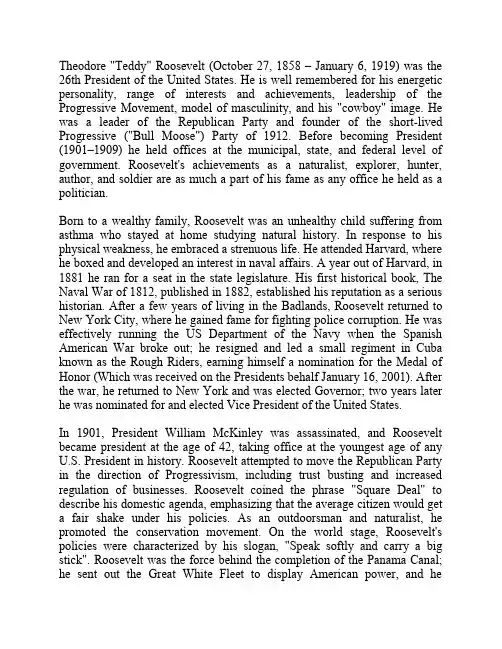
Theodore "Teddy" Roosevelt (October 27, 1858 – January 6, 1919) was the 26th President of the United States. He is well remembered for his energetic personality, range of interests and achievements, leadership of the Progressive Movement, model of masculinity, and his "cowboy" image. He was a leader of the Republican Party and founder of the short-lived Progressive ("Bull Moose") Party of 1912. Before becoming President (1901–1909) he held offices at the municipal, state, and federal level of government. Roosevelt's achievements as a naturalist, explorer, hunter, author, and soldier are as much a part of his fame as any office he held as a politician.Born to a wealthy family, Roosevelt was an unhealthy child suffering from asthma who stayed at home studying natural history. In response to his physical weakness, he embraced a strenuous life. He attended Harvard, where he boxed and developed an interest in naval affairs. A year out of Harvard, in 1881 he ran for a seat in the state legislature. His first historical book, The Naval War of 1812, published in 1882, established his reputation as a serious historian. After a few years of living in the Badlands, Roosevelt returned to New York City, where he gained fame for fighting police corruption. He was effectively running the US Department of the Navy when the Spanish American War broke out; he resigned and led a small regiment in Cuba known as the Rough Riders, earning himself a nomination for the Medal of Honor (Which was received on the Presidents behalf January 16, 2001). After the war, he returned to New York and was elected Governor; two years later he was nominated for and elected Vice President of the United States.In 1901, President William McKinley was assassinated, and Roosevelt became president at the age of 42, taking office at the youngest age of any U.S. President in history. Roosevelt attempted to move the Republican Party in the direction of Progressivism, including trust busting and increased regulation of businesses. Roosevelt coined the phrase "Square Deal" to describe his domestic agenda, emphasizing that the average citizen would get a fair shake under his policies. As an outdoorsman and naturalist, he promoted the conservation movement. On the world stage, Roosevelt's policies were characterized by his slogan, "Speak softly and carry a big stick". Roosevelt was the force behind the completion of the Panama Canal; he sent out the Great White Fleet to display American power, and henegotiated an end to the Russo-Japanese War, for which he won the Nobel Peace Prize. Roosevelt was the first American to win the Nobel Peace Prize. Roosevelt declined to run for re-election in 1908. After leaving office, he embarked on a safari to Africa and a trip to Europe. On his return to the US, a rift developed between Roosevelt and his anointed successor as President, William Howard Taft. Roosevelt attempted in 1912 to wrest the Republican nomination from Taft, and when he failed, he launched the Bull Moose Party. In the election, Roosevelt became the only third party candidate to come in second place, beating Taft but losing to Woodrow Wilson. After the election, Roosevelt embarked on a major expedition to South America; the river on which he traveled now bears his name. He contracted malaria on the trip, which damaged his health, and he died a few years later, at the age of 60. Roosevelt has consistently been ranked by scholars as one of the greatest U.S. Presidents.Presidency 1901–1909On September 6, President McKinley was shot while at the Pan-American Exposition in Buffalo, New York. Initial reports in the succeeding days suggested his condition was improving, so Roosevelt embarked on a vacation at Mount Marcy in upstate New York, across the state from Buffalo. He was returning from a climb to the summit on September 13 when a park ranger brought him a telegram informing him that McKinley's condition had deteriorated, and he was near death.Official White House portrait by John Singer SargentRoosevelt and his family immediately departed to go to Buffalo. When they reached the nearest train station at North Creek, at 5:22am on September 14, he received another telegram that McKinley had died a few hours earlier. Roosevelt arrived in Buffalo that afternoon, and was sworn in there as President at 3:30pm. Roosevelt continued McKinley's cabinet and promised to continue McKinley's policies. One of his first notable acts as president was to deliver a 20,000-word address to Congressasking it to curb the power of large corporations (called "trusts"). For his aggressive attacks on trusts over his two terms he has been called a "trust-buster."In the 1904 presidential election, Roosevelt won the presidency in his own right in a landslide victory. His vice president was Charles Fairbanks.Roosevelt dealt with union workers also. In May 1902, United Mine Workers went on strike to get higher pay wages and shorter work days. He set up a fact-finding commission which stopped the strike. It resulted in the workers getting more pay for less hours.In 1905, he issued a corollary to the Monroe Doctrine, which allows the United States to "exercise international policy power" so they can intervene and keep smaller countries on their feet.Roosevelt helped the well-being of people by passing laws such as The Meat Inspection Act of 1906 and The Pure Food and Drug Act. The Meat Inspection Act of 1906 banned misleading labels and preservatives that contained harmful chemicals in them. The Pure Food and Drug Act banned food and drugs, that are impure or falsely labeled, from being made, sold, and shipped.The Gentlemen's Agreement came into play in 1907, banning all school segregation, yet controlling Japanese immigration in California. That same year, Roosevelt signed the proclamation establishing Oklahoma as the 46th state of the Union.Building on McKinley's effective use of the press, Roosevelt made the White House the center of news every day, providing interviews and photo opportunities. After noticing the White House reporters huddled outside in the rain one day, he gave them their own room inside, effectively inventing the presidential press briefing. The grateful press, with unprecedented access to the White House, rewarded Roosevelt with ample coverage.He chose not to run for another term in 1908, and supported William Taft for the presidency, instead of Fairbanks. Fairbanks withdrew from the race, and would later support Taft for re-election against Roosevelt in the 1912 election.西奥多·罗斯福西奥多·罗斯福(Theodore Roosevelt,Jr.,人称老罗斯福,昵称泰迪(Teddy)1858年10月27日—1919年1月6日),美国军事家、政治家,第26任总统(1901-1909)。
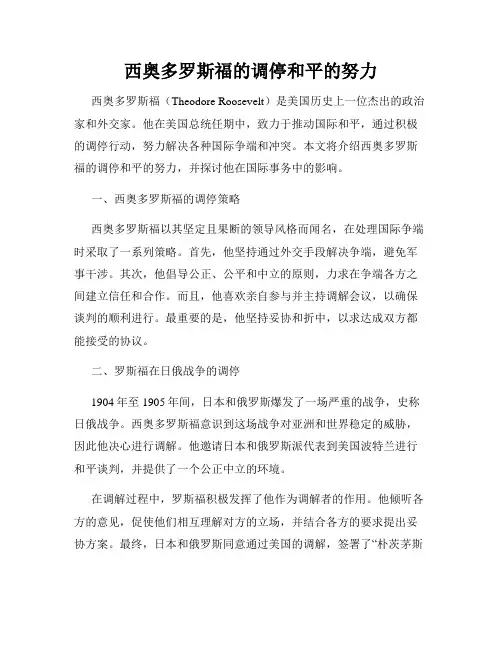
西奥多罗斯福的调停和平的努力西奥多罗斯福(Theodore Roosevelt)是美国历史上一位杰出的政治家和外交家。
他在美国总统任期中,致力于推动国际和平,通过积极的调停行动,努力解决各种国际争端和冲突。
本文将介绍西奥多罗斯福的调停和平的努力,并探讨他在国际事务中的影响。
一、西奥多罗斯福的调停策略西奥多罗斯福以其坚定且果断的领导风格而闻名,在处理国际争端时采取了一系列策略。
首先,他坚持通过外交手段解决争端,避免军事干涉。
其次,他倡导公正、公平和中立的原则,力求在争端各方之间建立信任和合作。
而且,他喜欢亲自参与并主持调解会议,以确保谈判的顺利进行。
最重要的是,他坚持妥协和折中,以求达成双方都能接受的协议。
二、罗斯福在日俄战争的调停1904年至1905年间,日本和俄罗斯爆发了一场严重的战争,史称日俄战争。
西奥多罗斯福意识到这场战争对亚洲和世界稳定的威胁,因此他决心进行调解。
他邀请日本和俄罗斯派代表到美国波特兰进行和平谈判,并提供了一个公正中立的环境。
在调解过程中,罗斯福积极发挥了他作为调解者的作用。
他倾听各方的意见,促使他们相互理解对方的立场,并结合各方的要求提出妥协方案。
最终,日本和俄罗斯同意通过美国的调解,签署了“朴茨茅斯和约”,结束了战争。
罗斯福因此成为第一个获得诺贝尔和平奖的美国总统。
三、罗斯福在巴拿马运河问题上的调停早期,法国尝试在巴拿马地区建设运河,但由于种种困难而失败。
西奥多罗斯福执政期间,美国决定接手巴拿马运河项目。
然而,哥伦比亚政府对于签署相应协议存在纷争。
西奥多罗斯福决定采取行动,为解决这一问题,推动了巴拿马独立运动,并通过与独立后的巴拿马政府签署《哈约-布恩契维利亚条约》,确保了巴拿马区域的旅行和运输的自由。
四、罗斯福在摩洛哥危机的调停1905年至1906年,法国和德国之间爆发了一场以摩洛哥为中心的危机,引发了欧洲的紧张局势。
西奥多罗斯福意识到这一危机的严重性,他邀请法国和德国的代表来美国,以就摩洛哥问题进行调解。
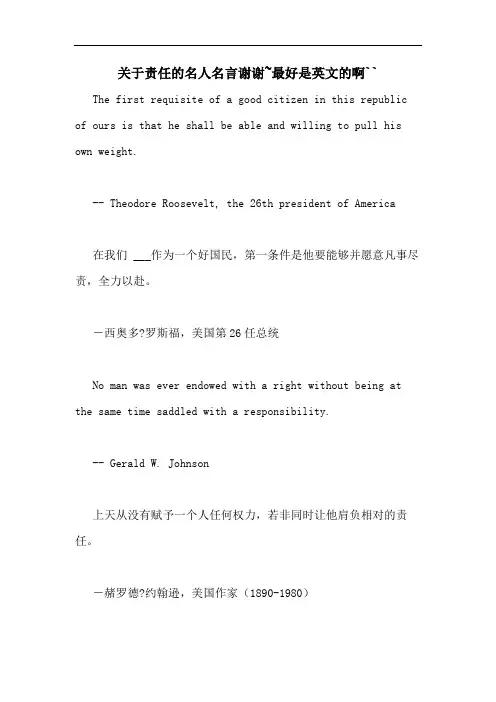
关于责任的名人名言谢谢~最好是英文的啊``The first requisite of a good citizen in this republic of ours is that he shall be able and willing to pull his own weight.-- Theodore Roosevelt, the 26th president of America在我们 ___作为一个好国民,第一条件是他要能够并愿意凡事尽责,全力以赴。
-西奥多?罗斯福,美国第26任总统No man was ever endowed with a right without being at the same time saddled with a responsibility.-- Gerald W. Johnson上天从没有赋予一个人任何权力,若非同时让他肩负相对的责任。
-赭罗德?约翰逊,美国作家(1890-1980)Responsibilities gravitate to the person who can shoulder them.-- Elbert Hubbard责任趋向於有能力担当的人。
-艾尔伯?哈柏德,美国思想家及作家(1856-1915)The willingness to aept responsibility for one's own life is the source from which self-respect springs.-- Joan Didion (1934- )承受个人生命责任的意愿即是自尊自重的泉源。
-珍?迪迪安,美国作家(1934- )With every civil right there has to be a corresponding civil obligation.-- Edison Haines每一项公民权都对应著一项公民责任。
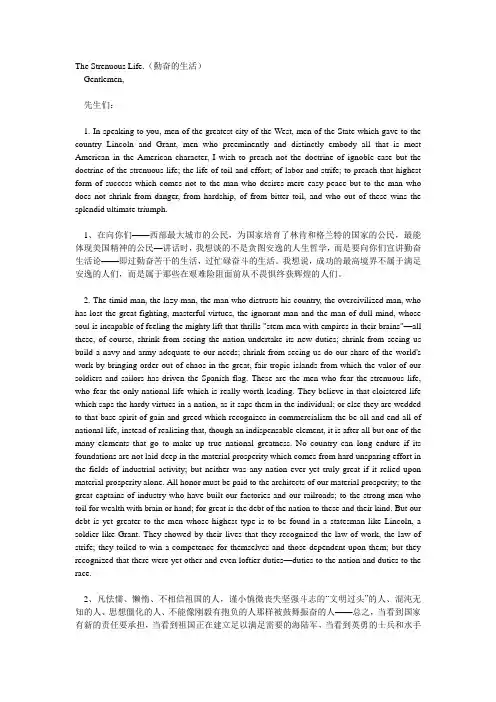
The Strenuous Life.(勤奋的生活)Gentlemen,先生们:1. In speaking to you, men of the greatest city of the West, men of the State which gave to the country Lincoln and Grant, men who preeminently and distinctly embody all that is most American in the American character, I wish to preach not the doctrine of ignoble ease but the doctrine of the strenuous life; the life of toil and effort; of labor and strife; to preach that highest form of success which comes not to the man who desires mere easy peace but to the man who does not shrink from danger, from hardship, of from bitter toil, and who out of these wins the splendid ultimate triumph.1、在向你们——西部最大城市的公民,为国家培育了林肯和格兰特的国家的公民,最能体现美国精神的公民—讲话时,我想谈的不是贪图安逸的人生哲学,而是要向你们宣讲勤奋生活论——即过勤奋苦干的生活,过忙碌奋斗的生活。
我想说,成功的最高境界不属于满足安逸的人们,而是属于那些在艰难险阻面前从不畏惧终获辉煌的人们。
2. The timid man, the lazy man, the man who distrusts his country, the overcivilized man, who has lost the great fighting, masterful virtues, the ignorant man and the man of dull mind, whose soul is incapable of feeling the mighty lift that thrills "stem men with empires in their brains"—all these, of course, shrink from seeing the nation undertake its new duties; shrink from seeing us build a navy and army adequate to our needs; shrink from seeing us do our share of the world's work by bringing order out of chaos in the great, fair tropic islands from which the valor of our soldiers and sailors has driven the Spanish flag. These are the men who fear the strenuous life, who fear the only national life which is really worth leading. They believe in that cloistered life which saps the hardy virtues in a nation, as it saps them in the individual; or else they are wedded to that base spirit of gain and greed which recognizes in commercialism the be-all and end-all of national life, instead of realizing that, though an indispensable element, it is after all but one of the many elements that go to make up true national greatness. No country can long endure if its foundations are not laid deep in the material prosperity which comes from hard unsparing effort in the fields of industrial activity; but neither was any nation ever yet truly great if it relied upon material prosperity alone. All honor must be paid to the architects of our material prosperity; to the great captains of industry who have built our factories and our railroads; to the strong men who toil for wealth with brain or hand; for great is the debt of the nation to these and their kind. But our debt is yet greater to the men whose highest type is to be found in a statesman like Lincoln, a soldier like Grant. They showed by their lives that they recognized the law of work, the law of strife; they toiled to win a competence for themselves and those dependent upon them; but they recognized that there were yet other and even loftier duties—duties to the nation and duties to the race.2、凡怯懦、懒惰、不相信祖国的人,谨小慎微丧失坚强斗志的“文明过头”的人、混沌无知的人、思想僵化的人、不能像刚毅有抱负的人那样被鼓舞振奋的人——总之,当看到国家有新的责任要承担,当看到祖国正在建立足以满足需要的海陆军,当看到英勇的士兵和水手在美丽的热带岛屿上驱逐西班牙势力,承担起应尽的世界责任,恢复当地秩序——当看到这一切时,所有这些人都退缩了。
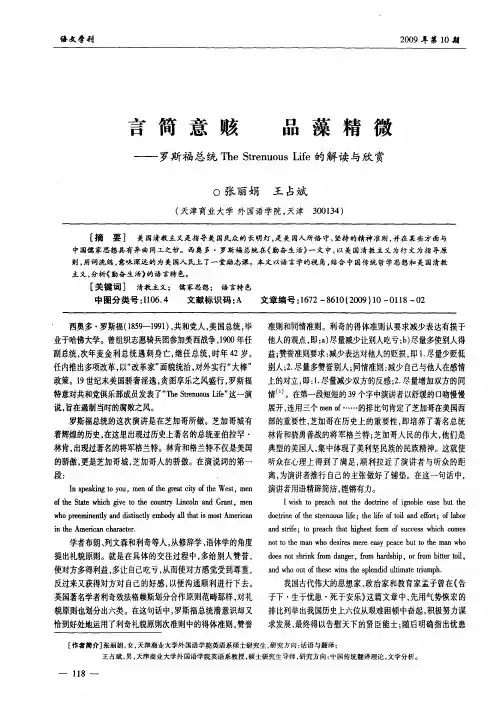
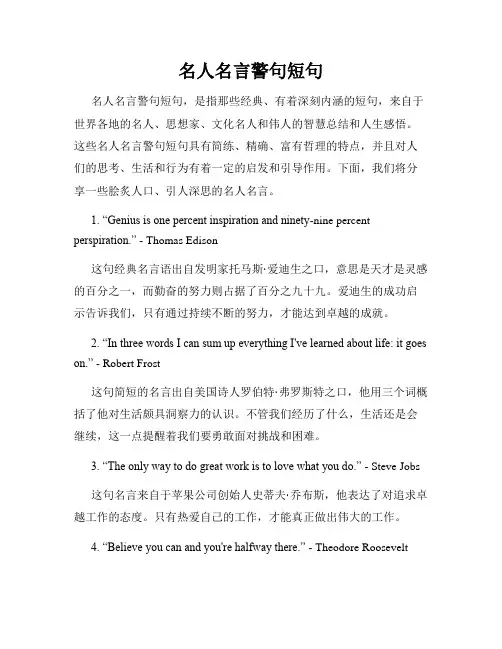
名人名言警句短句名人名言警句短句,是指那些经典、有着深刻内涵的短句,来自于世界各地的名人、思想家、文化名人和伟人的智慧总结和人生感悟。
这些名人名言警句短句具有简练、精确、富有哲理的特点,并且对人们的思考、生活和行为有着一定的启发和引导作用。
下面,我们将分享一些脍炙人口、引人深思的名人名言。
1. “Genius is one percent inspiration and ninety-nine percent perspiration.” - Thomas Edison这句经典名言语出自发明家托马斯·爱迪生之口,意思是天才是灵感的百分之一,而勤奋的努力则占据了百分之九十九。
爱迪生的成功启示告诉我们,只有通过持续不断的努力,才能达到卓越的成就。
2. “In three words I can sum up everything I've learned about life: it goes on.” - Robert Frost这句简短的名言出自美国诗人罗伯特·弗罗斯特之口,他用三个词概括了他对生活颇具洞察力的认识。
不管我们经历了什么,生活还是会继续,这一点提醒着我们要勇敢面对挑战和困难。
3. “The only way to do great work is to love what you do.” - Steve Jobs这句名言来自于苹果公司创始人史蒂夫·乔布斯,他表达了对追求卓越工作的态度。
只有热爱自己的工作,才能真正做出伟大的工作。
4. “Believe you can and you're halfway there.” - Theodore Roosevelt这句名言来自于美国前总统西奥多·罗斯福,他告诉我们相信自己可以,你已经走了一半的路。
信念塑造现实,只有相信自己,才能克服困难,实现目标。
5. “The greatest glory in living lies not in never falling, but in rising every time we fall.” - Nelson Mandela这句勉励人心的名言出自南非前总统纳尔逊·曼德拉之口,他告诉我们真正的荣耀不在于从不倒下,而是每次倒下后都能重新站起来。
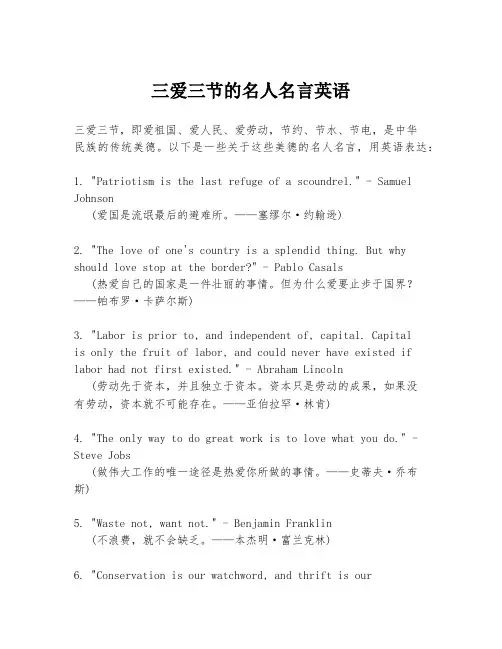
三爱三节的名人名言英语三爱三节,即爱祖国、爱人民、爱劳动,节约、节水、节电,是中华民族的传统美德。
以下是一些关于这些美德的名人名言,用英语表达:1. "Patriotism is the last refuge of a scoundrel." - Samuel Johnson(爱国是流氓最后的避难所。
——塞缪尔·约翰逊)2. "The love of one's country is a splendid thing. But why should love stop at the border?" - Pablo Casals(热爱自己的国家是一件壮丽的事情。
但为什么爱要止步于国界?——帕布罗·卡萨尔斯)3. "Labor is prior to, and independent of, capital. Capitalis only the fruit of labor, and could never have existed if labor had not first existed." - Abraham Lincoln(劳动先于资本,并且独立于资本。
资本只是劳动的成果,如果没有劳动,资本就不可能存在。
——亚伯拉罕·林肯)4. "The only way to do great work is to love what you do." - Steve Jobs(做伟大工作的唯一途径是热爱你所做的事情。
——史蒂夫·乔布斯)5. "Waste not, want not." - Benjamin Franklin(不浪费,就不会缺乏。
——本杰明·富兰克林)6. "Conservation is our watchword, and thrift is ourprinciple." - Theodore Roosevelt(节约是我们的口号,节俭是我们的原则。
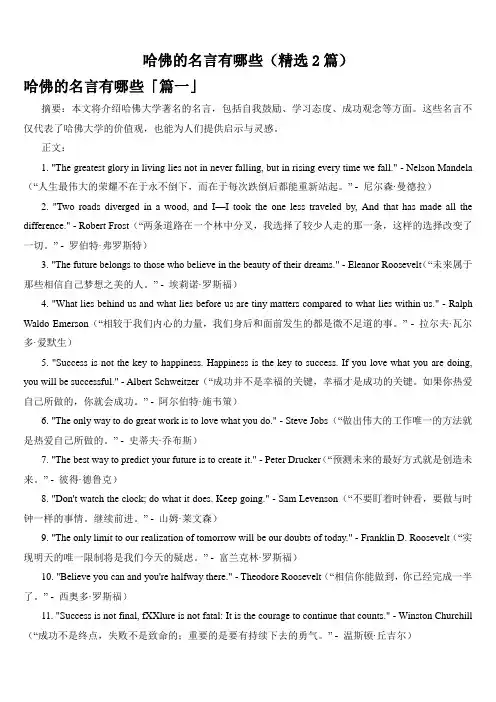
哈佛的名言有哪些(精选2篇)哈佛的名言有哪些「篇一」摘要:本文将介绍哈佛大学著名的名言,包括自我鼓励、学习态度、成功观念等方面。
这些名言不仅代表了哈佛大学的价值观,也能为人们提供启示与灵感。
正文:1. "The greatest glory in living lies not in never falling, but in rising every time we fall." - Nelson Mandela (“人生最伟大的荣耀不在于永不倒下,而在于每次跌倒后都能重新站起。
” - 尼尔森·曼德拉)2. "Two roads diverged in a wood, and I—I took the one less traveled by, And that has made all the difference." - Robert Frost(“两条道路在一个林中分叉,我选择了较少人走的那一条,这样的选择改变了一切。
” - 罗伯特·弗罗斯特)3. "The future belongs to those who believe in the beauty of their dreams." - Eleanor Roosevelt(“未来属于那些相信自己梦想之美的人。
” - 埃莉诺·罗斯福)4. "What lies behind us and what lies before us are tiny matters compared to what lies within us." - Ralph Waldo Emerson(“相较于我们内心的力量,我们身后和面前发生的都是微不足道的事。
” - 拉尔夫·瓦尔多·爱默生)5. "Success is not the key to happiness. Happiness is the key to success. If you love what you are doing, you will be successful." - Albert Schweitzer(“成功并不是幸福的关键,幸福才是成功的关键。
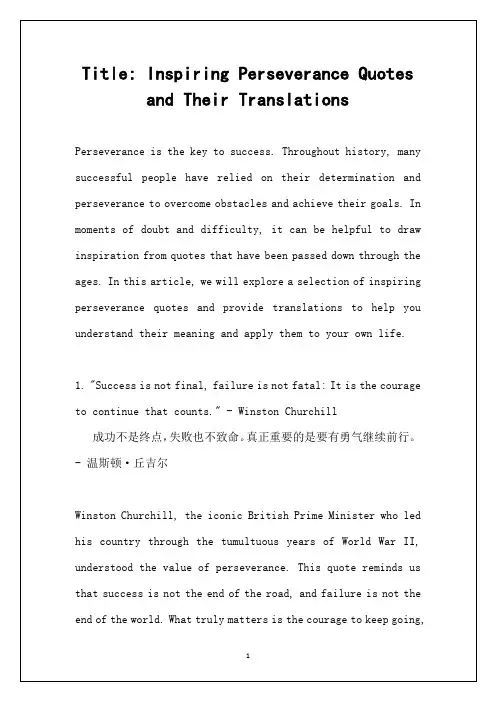
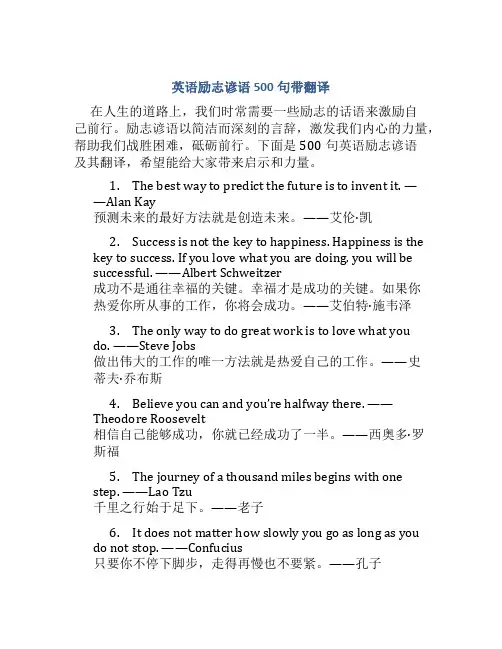
英语励志谚语500句带翻译在人生的道路上,我们时常需要一些励志的话语来激励自己前行。
励志谚语以简洁而深刻的言辞,激发我们内心的力量,帮助我们战胜困难,砥砺前行。
下面是500句英语励志谚语及其翻译,希望能给大家带来启示和力量。
1.The best way to predict the future is to invent it. ——Alan Kay预测未来的最好方法就是创造未来。
——艾伦·凯2.Success is not the key to happiness. Happiness is thekey to success. If you love what you are doing, you will besuccessful. ——Albert Schweitzer成功不是通往幸福的关键。
幸福才是成功的关键。
如果你热爱你所从事的工作,你将会成功。
——艾伯特·施韦泽3.The only way to do great work is to love what youdo. ——Steve Jobs做出伟大的工作的唯一方法就是热爱自己的工作。
——史蒂夫·乔布斯4.Believe you ca n and you’re halfway there. ——Theodore Roosevelt相信自己能够成功,你就已经成功了一半。
——西奥多·罗斯福5.The journey of a thousand miles begins with onestep. ——Lao Tzu千里之行始于足下。
——老子6.It does not matter how slowly you go as long as youdo not stop. ——Confucius只要你不停下脚步,走得再慢也不要紧。
——孔子7.Success is not the result of spontaneous combustion.You must set yourself on fire. ——Arnold H. Glasow成功不是偶然发生的结果。
勤奋地生活(1899 年4 月10 日)[美国] 西奥多·罗斯福先生们:你们是西方最大城市的公民,是产生了林肯和格兰特的国家的公民。
你们卓越和杰出地体现了美国性格中最具美国特色的一切。
在向你们这样的人物讲话时,我想谈的不是苟且偷安的人生哲学,而是过勤奋生活的道理——过艰苦奋斗的生活,劳动、竞争的生活;我想谈那种最崇高的成就,即贪图安逸之辈与之无缘,而不畏艰险、不避劳苦从而获得最大的辉煌胜利的人才能取得的那种成就。
胆小的人,懒惰的人,不信任祖国的人,丧失坚强斗志和英勇气概的“过于文明”的人,愚昧无知的人,对“胸怀大志的铮铮铁汉”亦为之动容的巨大鼓舞力量也无动于衷的、麻木不仁的人——总之,所有这些人都闭眼不看国家正在承担新的责任;闭眼不看我们正在建设能满足我国需要的海军和陆军;闭眼不看我们正在世界事务中尽我们自己的一份力量;我们英勇的陆、海军士兵把西班牙势力逐出了美丽的热带岛国,恢复了那里的秩序1。
这是这样一些人,他们害怕过勤奋的生活,害怕过惟一真正有价值的国民生活。
他们相信与世隔绝的生活,那种生活会消蚀一个民族的吃苦耐劳美德,正象消蚀个人的吃苦耐劳美德一样。
不然,他们就沉湎于唯利是图、贪得无厌的泥潭而不能自拔,认为经商致富乃国民生活之根本。
殊不知,经商致富固然重要,但毕竟只是造就真正伟大国家的许多环节中的一环而已。
物质繁荣来自勤俭,来自干劲和事业心,来自工业活动领域中的艰苦努力;任何国家,如果没有深厚的物质繁荣的基础,都不可能长久生存下去;但是,如果仅仅依赖于物质繁荣,任何国家也永远不会成为真正伟大的国家。
不错,一切荣誉应当归之于物质繁荣的设计师;归之于创办了工厂和铁路的实业巨头;归之于那些为了富裕而殚精竭虑、不辞劳苦的强人;国家大大感激这些人以及诸如此类的人。
但是,我们更感激那样一些人,他们的最崇高典范应当到林肯那样的政治家和格兰特那样的军人当中去寻找。
他们以自己的所作所为表明,他们深谙工作的法则和斗争的法则;他们含辛茹苦,使自己和家属过上了富足的生活;但他们懂得还有更崇高的责任——对国家的责任和对民族的责任。
The Strenuous Life.(勤奋的生活)Gentlemen,先生们:1. In speaking to you, men of the greatest city of the West, men of the State which gave to the country Lincoln and Grant, men who preeminently and distinctly embody all that is most American in the American character, I wish to preach not the doctrine of ignoble ease but the doctrine of the strenuous life; the life of toil and effort; of labor and strife; to preach that highest form of success which comes not to the man who desires mere easy peace but to the man who does not shrink from danger, from hardship, of from bitter toil, and who out of these wins the splendid ultimate triumph.1、在向你们——西部最大城市的公民,为国家培育了林肯和格兰特的国家的公民,最能体现美国精神的公民—讲话时,我想谈的不是贪图安逸的人生哲学,而是要向你们宣讲勤奋生活论——即过勤奋苦干的生活,过忙碌奋斗的生活。
我想说,成功的最高境界不属于满足安逸的人们,而是属于那些在艰难险阻面前从不畏惧终获辉煌的人们。
2. The timid man, the lazy man, the man who distrusts his country, the overcivilized man, who has lost the great fighting, masterful virtues, the ignorant man and the man of dull mind, whose soul is incapable of feeling the mighty lift that thrills "stem men with empires in their brains"—all these, of course, shrink from seeing the nation undertake its new duties; shrink from seeing us build a navy and army adequate to our needs; shrink from seeing us do our share of the world's work by bringing order out of chaos in the great, fair tropic islands from which the valor of our soldiers and sailors has driven the Spanish flag. These are the men who fear the strenuous life, who fear the only national life which is really worth leading. They believe in that cloistered life which saps the hardy virtues in a nation, as it saps them in the individual; or else they are wedded to that base spirit of gain and greed which recognizes in commercialism the be-all and end-all of national life, instead of realizing that, though an indispensable element, it is after all but one of the many elements that go to make up true national greatness. No country can long endure if its foundations are not laid deep in the material prosperity which comes from hard unsparing effort in the fields of industrial activity; but neither was any nation ever yet truly great if it relied upon material prosperity alone. All honor must be paid to the architects of our material prosperity; to the great captains of industry who have built our factories and our railroads; to the strong men who toil for wealth with brain or hand; for great is the debt of the nation to these and their kind. But our debt is yet greater to the men whose highest type is to be found in a statesman like Lincoln, a soldier like Grant. They showed by their lives that they recognized the law of work, the law of strife; they toiled to win a competence for themselves and those dependent upon them; but they recognized that there were yet other and even loftier duties—duties to the nation and duties to the race.2、凡怯懦、懒惰、不相信祖国的人,谨小慎微丧失坚强斗志的“文明过头”的人、混沌无知的人、思想僵化的人、不能像刚毅有抱负的人那样被鼓舞振奋的人——总之,当看到国家有新的责任要承担,当看到祖国正在建立足以满足需要的海陆军,当看到英勇的士兵和水手在美丽的热带岛屿上驱逐西班牙势力,承担起应尽的世界责任,恢复当地秩序——当看到这一切时,所有这些人都退缩了。
简短国外名人名言人类历史上出现过很多富有智慧和启发性的名人,他们通过自己的言行留下了经典的名言,这些名言成为后人思考和学习的重要资料。
下面是一些简短而精辟的国外名人名言。
1. "If you can dream it, you can achieve it." - Walt Disney(如果你能够梦见它,你就能实现它。
- 瓦特·迪士尼)这句话来自于迪士尼创始人瓦特·迪士尼,他通过这句名言鼓励人们勇敢追求自己的梦想。
迪士尼坚信,只要你有梦想并为之努力,你就能够实现它。
2. "The only way to do great work is to love what you do." - Steve Jobs(只有热爱你所做的工作,才能做出伟大的成就。
- 史蒂夫·乔布斯)这句话源自于苹果创始人史蒂夫·乔布斯,他认为只有对自己的工作充满热爱,才能够做出卓越的成果。
乔布斯的成功就是一个典型的例子,他的激情和热爱推动了他创造出众多划时代的产品。
3. "In three words I can sum up everything I've learned about life: it goes on." - Robert Frost(用三个词我可以总结我对于生活所学到的一切:生活继续。
- 罗伯特·弗罗斯特)这是美国著名诗人罗伯特·弗罗斯特的名言,他通过这句话告诉我们,无论遇到怎样的挫折和困难,生活都会继续下去。
这句话传递了一种积极向上的态度,鼓励我们面对挑战,坚持前行。
4. "The best way to predict the future is to create it." - Peter Drucker(预测未来最好的方式是去创造它。
- 彼得·德鲁克)这句话出自管理学奠基人彼得·德鲁克之口,他认为我们可以通过自己的努力和创造力来主导未来的发展。
美国历届总统:西奥多·罗斯福 2008年10月13日10:50 腾讯文化我要评论(0)第 1 2 3 页西奥多·罗斯福西奥多·罗斯福(Theodore Roosevelt,Jr.,人称老罗斯福,昵称泰迪(Teddy) 18 58年10月27日—1919年1月6日),美国军事家、政治家,第26任总统(1901-1909)。
曾任海军副部长,1900年当选副总统。
1901年总统威廉·麦金莱(William McKinley)被无政府主义者刺杀身亡,他继任成为美国总统,时年42岁,是美国历史上最年轻的在任总统。
他的独特个性和改革主义政策,使他成为美国历史上最伟大的总统之一。
在他的总统任期内,对国内的主要贡献是建立资源保护政策,保护了森林、矿产、石油等资源;建立公平交易法案,推动劳资和解。
对外奉行门罗主义,实行扩张政策,建设强大军队,干涉美洲事务。
西奥多·罗斯福发动“进步主义”运动。
他们主张用联邦政府的权力对现行秩序加以改革,使美国社会重新走向和谐。
他们把反垄断作为改革的主要内容。
西奥多·罗斯福的改革理念是调整财产与公共福利的关系,重新把公共福利置于个人财产,即发展之上。
在他看来,这是重建社会和谐的主旨。
西奥多·罗斯福说,“我们正面临着财产对人类福利的新看法……有人错误地认为,一切人权同利润相比都是次要的。
现在,这样的人必须给那些维护人类福利的人民让步了。
每个人拥有的财产都要服从社会的整体权利,按公共福利的要求来规定使用到什么程度。
”在这一理念指导下,西奥多·罗斯福开始反垄断斗争,他把矛头指向摩根的铁路控股公司———北方证券公司,对它提出起诉。
他又强迫一个煤矿接受政府对罢工的调解,这是联邦政府第一次支持有组织的罢工。
西奥多·罗斯福的这些行动得到了人民的称道,他因此获得了“托拉斯爆破手”的美名。
但他也遭到了保守派的攻击,1896年总统的制造者、政治老板马克·汉纳大骂这个“该死的牛仔”。
Strenuous LifeTHEODORE ROOSEVELT, (10 April 1899)[1] In speaking to you, men of the greatest city of the West, men of the State which gave to the country Lincoln and Grant, men who pre-eminently and distinctly embody all that is most American in the American character, I wish to preach, not the doctrine of ignoble ease, but the doctrine of the strenuous life, the life of toil and effort, of labor and strife; to preach that highest form of success which comes, not to the man who desires mere easy peace, but to the man who does not shrink from danger, from hardship, or from bitter toil, and who out of these wins the splendid ultimate triumph.[2] A life of ignoble ease, a life of that peace which springs merely from lack either of desire or of power to strive after great things, is as little worthy of a nation as of an individual. I ask only that what every self-respecting American demands from himself and from his sons shall be demanded of the American nation as a whole. Who among you would teach your boys that ease, that peace, is to be the first consideration in their eyes-to be the ultimate goal after which they strive? You men of Chicago have made this city great, you men of Illinois have done your share, and more than your share, in making Americagreat, because you neither preach nor practice such a doctrine. You work yourselves, and you bring up your sons to work. If you are rich and are worth your salt, you will teach your sons that though they may have leisure, it is not to be spent in idleness; for wisely used leisure merely means that those who possess it, being free from the necessity of working for their livelihood, are all the more bound to carry on some kind of non-remunerative work in science, in letters, in art, in exploration, in historical research-work of the type we most need in this country, the successful carrying out of which reflects most honor upon the nation.[3] We do not admire the man of timid peace. We admire the man who embodies victorious effort; the man who never wrongs his neighbor, who is prompt to help a friend, but who has those virile qualities necessary to win in the stern strife of actual life. It is hard to fail, but it is worse never to have tried to succeed. In this life we get nothing save by effort. Freedom from effort in the present merely means that there has been stored up effort in the past. A man can be freed from the necessity of work only by the fact that he or his fathers before him have worked to good purpose. If the freedom thus purchased is used aright, and the man still does actual work, though of a different kind, whether as a writer or a General, whether in the field of politics or in the field of exploration and adventure, he shows he deserves his good fortune. But if he treats this period of freedom from the need of actual labor as a period not of preparation, but of mere enjoyment, he shows that he is simplya cumberer of the earth’s surface, and he surely unfits himself to hold his own with his fellows if the need to do so should again arise. A mere life of ease is not in the end a very satisfactory life, and, above all, it is a life which ultimately unfits those who follow it for serious work in the world.[4] As it is with the individual, so it is with the nation. It is a base untruth to say that happy is the nation that has no history. Thrice happy is the nation that has a glorious history. Far better it is to dare mighty things, to win glorious triumphs, even though checkered by failure, than to take rank with those poor spirits who neither enjoy much nor suffer much, because they live in the gray twilight that knows not victory nor defeat. If in 1861 the men who loved the Union had believed that peace was the end of all things, and war and strife the worst of all things, and had acted up to their belief, we would have saved hundreds of thousands of lives, we would have saved hundreds of millions of dollars. Moreover, besides saving all the blood and treasure we then lavished, we would have prevented the heartbreak of many women, the dissolution of many homes, and we would have spared the country those months of gloom and shame when it seemed as if our armies marched only to defeat. We could have avoided all this suffering simply by shrinking from strife. And if we had thus avoided it, we would have shown that we were weaklings, and that we were unfit to stand among the great nations of the earth. Thank God for the iron in the blood of our fathers, the men who upheld the wisdom of Lincoln, and bore sword or rifle in the armies of Grant! Let us,the children of the men who proved themselves equal to the mighty days-let us, the children of the men who carried the great Civil War to a triumphant conclusion, praise the God of our fathers that the ignoble counsels of peace were rejected; that the suffering and loss, the blackness of sorrow and despair, were unflinchingly faced, and the years of strife endured; for in the end the slave was freed, the Union restored, and the mighty American republic placed once more as a helmeted queen among nations.[5] We of this generation do not have to face a task such as that our fathers faced, but we have our tasks, and woe to us if we fail to perform them! We cannot, if we would, play the part of China, and be content to rot by inches in ignoble ease within our borders, taking no interest in what goes on beyond them, sunk in a scrambling commercialism; heedless of the higher life, the life of aspiration, of toil and risk, busying ourselves only with the wants of our bodies for the day, until suddenly we should find, beyond a shadow of question, what China has already found, that in this world the nation that has trained itself to a career of unwarlike and isolated ease is bound, in the end, to go down before other nations which have not lost the manly and adventurous qualities. If we are to be a really great people, we must strive in good faith to play a great part in the world. We cannot avoid meeting great issues. All that we can determine for ourselves is whether we shall meet them well or ill. Last year we could not help being brought face to face with the problem of war with Spain. All we could decide was whether we should shrink like cowards fromthe contest, or enter into it as beseemed a brave and high-spirited people; and; once in, whether failure or success should crown our banners. So it is now. We cannot avoid the responsibilities that confront us in Hawaii, Cuba, Porto Rico, and the Philippines. All we can decide is whether we shall meet them in a way that will redound to the national credit, or whether we shall make of our dealings with these new problems a dark and shameful page in our history. To refuse to deal with them at all merely amounts to dealing with them badly. We have a given problem to solve. If we undertake the solution, there is, of course, always danger that we may not solve it aright; but to refuse to undertake the solution simply renders it certain that we cannot possibly solve it aright.[6] The timid man, the lazy man, the man who distrusts his country, theover-civilized man, who has lost the great fighting, masterful virtues, the ignorant man, and the man of dull mind, whose soul is incapable of feeling the mighty lift that thrills “stern men with empires in their brains”-all these, of course, shrink from seeing the nation undertake its new duties; shrink from seeing us build a navy and an army adequate to our needs; shrink from seeing us do our share of the world’s work, by bringing order out of chaos in the great, fair tropic islands from which the valor of our soldiers and sailors has driven the Spanish flag. These are the men who fear the strenuous life, who fear the only national life which is really worth leading. They believe in that cloistered life which saps the hardy virtues in a nation, as it saps them in the individual; or else they are wedded to that base spirit of gain and greed which recognizesin commercialism the be-all and end-all of national life, instead of realizing that, though an indispensable element, it is, after all, but one of the many elements that go to make up true national greatness. No country can long endure if its foundations are not laid deep in the material prosperity which comes from thrift, from business energy and enterprise, from hard, unsparing effort in the fields of industrial activity; but neither was any nation ever yet truly great if it relied upon material prosperity alone. All honor must be paid to the architects of our material prosperity, to the great captains of industry who have built our factories and our railroads, to the strong men who toil for wealth with brain or hand; for great is the debt of the nation to these and their kind. But our debt is yet greater to the men whose highest type is to be found in a statesman like Lincoln, a soldier like Grant. They showed by their lives that they recognized the law of work, the law of strife; they toiled to win a competence for themselves and those dependent upon them; but they recognized that there were yet other and even loftier duties – duties to the nation and duties to the race.[7] We cannot sit huddled within our own borders and avow ourselves merely an assemblage of well-to-do hucksters who care nothing for what happens beyond. Such a policy would defeat even its own end; for as the nations grow to have ever wider and wider interests, and are brought into closer and closer contact, if we are to hold our own in the struggle for naval and commercial supremacy, we must build up our power without our own borders. We mustbuild the isthmian canal, and we must grasp the points of vantage which will enable us to have our say in deciding the destiny of the oceans of the East and the West.[8] So much for the commercial side. From the standpoint of international honor the argument is even stronger. The guns that thundered off Manila and Santiago, left us echoes of glory, but they also left us a legacy of duty. If we drove out a medieval tyranny only to make room for savage anarchy, we had better not have begun the task at all. It is worse than idle to say that we have no duty to perform, and can leave to their fates the islands we have conquered. Such a course would be the course of infamy. It would be followed at once by utter chaos in the wretched islands themselves. Some stronger, manlier power would have to step in and do the work, and we would have shown ourselves weaklings, unable to carry to successful completion the labors that great and high-spirited nations are eager to undertake.[9] The work must be done; we cannot escape our responsibility; and if we are worth our salt, we shall be glad of the chance to do the work – glad of the chance to show ourselves equal to one of the great tasks set modern civilization. But let us not deceive ourselves as to the importance of the task. Let us not be misled by vainglory into underestimating the strain it will put on our powers. Above all, let us, as we value our own self-respect, face the responsibilities with proper seriousness, courage, and high resolve. We mustdemand the highest order of integrity and ability in our public men who are to grapple with these new problems. We must hold to a rigid accountability those public servants who show unfaithfulness to the interests of the nation or inability to rise to the high level of the new demands upon our strength and our resources.[10] Of course we must remember not to judge any public servant by any one act, and especially should we beware of attacking the men who are merely the occasions and not the causes of disaster. Let me illustrate what I mean by the army and the navy. If twenty years ago we had gone to war, we should have found the navy as absolutely unprepared as the army. At that time our ships could not have encountered with success the fleets of Spain any more than nowadays we can put untrained soldiers, no matter how brave, who are armed with archaic black-powder weapons, against well-drilled regulars armed with the highest type of modern repeating rifle. But in the early eighties the attention of the nation became directed to our naval needs. Congress most wisely made a series of appropriations to build up a new navy, and under a succession of able and patriotic secretaries, of both political parties, the navy was gradually built up, until its material became equal to its splendid personnel, with the result that last summer it leaped to its proper place as one of the most brilliant and formidable fighting navies in the entire world. We rightly pay all honor to the men controlling the navy at the time it won these great deeds, honor to Secretary Long and Admiral Dewey, to the captains whohandled the ships in action, to the daring lieutenants who braved death in the smaller craft, and to the heads of bureaus at Washington who saw that the ships were so commanded, so armed, so equipped, so well engined, as to insure the best results. But let us also keep ever in mind that all of this would not have availed if it had not been for the wisdom of the men who during the preceding fifteen years had built up the navy. Keep in mind the secretaries of the navy during those years; keep in mind the senators and congressmen who by their votes gave the money necessary to build and to armor the ships, to construct the great guns, and to train the crews; remember also those who actually did build the ships, the armor, and the guns; and remember the admirals and captains who handled battle-ship, cruiser, and torpedo-boat on the high seas, alone and in squadrons, developing the seamanship, the gunnery, and the power of acting together, which their successors utilized so gloriously at Manila and off Santiago.[11] And, gentlemen, remember the converse, too. Remember that justice has two sides. Be just to those who built up the navy, and, for the sake of the future of the country, keep in mind those who opposed its building up. Read the Congressional Record. Find out the senators and congressmen who opposed the grants for building the new ships; who opposed the purchase of armor, without which the ships were worthless; who opposed any adequate maintenance for the Navy Department, and strove to cut down the number of men necessary to man our fleets. The men who did these things were one andall working to bring disaster on the country. They have no share in the glory of Manila, in the honor of Santiago. They have no cause to feel proud of the valor of our sea-captains, of the renown of our flag. Their motives may or may not have been good, but their acts were heavily fraught with evil. They did ill for the national honor, and we won in spite of their sinister opposition.[12] Now, apply all this to our public men of to-day. Our army has never been built up as it should be built up. I shall not discuss with an audience like this the puerile suggestion that a nation of seventy millions of freemen is in danger of losing its liberties from the existence of an army of 100,000 men, three fourths of whom will be employed in certain foreign islands, in certain coast fortresses, and on Indian reservations. No man of good sense and stout heart can take such a proposition seriously. If we are such weaklings as the proposition implies, then we are unworthy of freedom in any event. To no body of men in the United States is the country so much indebted as to the splendid officers and enlisted men of the regular army and navy. There is no body from which the country has less to fear, and none of which it should be prouder, none which it should be more anxious to upbuild.[13] Our army needs complete reorganization-not merely enlarging-and the reorganization can only come as the result of legislation. A proper general staff should be established, and the positions of ordnance, commissary, and quartermaster officers should be filled by detail from the line. Above all, thearmy must be given the chance to exercise in large bodies. Never again should we see, as we saw in the Spanish war, major-generals in command of divisions who had never before commanded three companies together in the field. Yet, incredible to relate, the recent Congress has shown a queer inability to learn some of the lessons of the war. There were large bodies, of men in both branches who opposed the declaration of war, who opposed the ratification of peace, who opposed the upbuilding of the army, and who even opposed the purchase of: armor at a reasonable price for the battle-ships and cruisers, thereby putting an absolute stop to the building of any new fighting-ships for the navy. If, during the years to come, any disaster should befall our arms, afloat or ashore, and thereby any shame come to the United States, remember that the blame will lie upon the men whose names appear upon the roll-calls of Congress on the wrong side of these great questions. On them will lie the burden of any loss of our soldiers and sailors, of any dishonor to the flag; and upon you and the people of this country will lie the blame if you do not repudiate, in no unmistakable way, what these men have done. The blame will not rest upon the untrained commander of untried troops, upon the civil officers of a department the organization of which has been left utterly inadequate, or upon the admiral with an insufficient number of ships; but upon the public men who have so lamentably failed in forethought as to refuse to remedy these evils long in advance, and upon the nation that stands behind those public men.[14] So, at the present hour, no small share of the responsibility for the blood shed in the Philippines, the blood of our brothers, and the blood of their wild and ignorant foes, lies at the thresholds of those who so long delayed the adoption of the treaty of peace, and of those who by their worse than foolish words deliberately invited a savage people to plunge into a war fraught with sure disaster for them – a war, too, in which our own brave men who follow the flag must pay with their blood for the silly, mock humanitarianism of the prattlers who sit at home in peace.[15] The army and the navy are the sword and the shield which this nation must carry if she is to do her duty among the nations of the earth – if she is not to stand merely as the China of the western hemisphere. Our proper conduct toward the tropic islands we have wrested from Spain is merely the form which our duty has taken at the moment. Of course we are bound to handle the affairs of our own household well. We must see that there is civic honesty, civic cleanliness, civic good sense in our home administration of city, State, and nation. We must strive for honesty in office, for honesty toward the creditors of the nation and of the individual; for the widest freedom of individual initiative where possible, and for the wisest control of individual initiative where it is hostile to the welfare of the many. But because we set our own household in order we are not thereby excused from playing our part in the great affairs of the world. A man’s first duty is to his own home, but h e is not thereby excused from doing his duty to the State; for if he fails in thissecond duty it is under the penalty of ceasing to be a free man. In the same way, while a nation’s first duty is within its own borders, it is not thereby absolved from facing its duties in the world as a whole; and if it refuses to do so, it merely forfeits its right to struggle for a place among the peoples that shape the destiny of mankind.[16] In the West Indies and the Philippines alike we are confronted by most difficult problems. It is cowardly to shrink from solving them in the proper way; for solved they must be, if not by us, then by some stronger and more manful race. If we are too weak, too selfish, or too foolish to solve them, some bolder and abler people must undertake the solution. Personally, I am far too firm a believer in the greatness of my country and the power of my countrymen to admit for one moment that we shall ever be driven to the ignoble alternative.[17] The problems are different for the different islands. Porto Rico is not large enough to stand alone. We must govern it wisely and well, primarily in the interest of its own people. Cuba is, in my judgment, entitled ultimately to settle for itself whether it shall be an independent state or an integral portion of the mightiest of republics. But until order and stable liberty are secured, we must remain in the island to insure them, and infinite tact, judgment, moderation, and courage must be shown by our military and civil representatives in keeping the island pacified, in relentlessly stamping outbrigandage, in protecting all alike, and yet in showing proper recognition to the men who have fought for Cuban liberty. The Philippines offer a yet graver problem. Their population includes half-caste and native Christians, warlike Moslems, and wild pagans. Many of their people are utterly unfit forself-government, and show no signs of becoming fit. Others may in time become fit but at present can only take part in self-government under a wise supervision, at once firm and beneficent. We have driven Spanish tyranny from the islands. If we now let it be replaced by savage anarchy, our work has been for harm and not for good. I have scant patience with those who fear to undertake the task of governing the Philippines, and who openly avow that they do fear to undertake it, or that they shrink from it because of the expense and trouble; but I have even scanter patience with those who make a pretense of humanitarianism to hide and cover their timidity, and who cant about “liberty” and the “consent of the governed,” in order to excuse themselves for their unwillingness to play the part of men. Their doctrines, if carried out, would make it incumbent upon us to leave the Apaches of Arizona to work out their own salvation, and to decline to interfere in a single Indian reservation. Their doctrines condemn your forefathers and mine for ever having settled in these United States.[18] England’s rule in India and Egypt has been of great benefit to England, for it has trained up generations of men accustomed to look at the larger and loftier side of public life. It has been of even greater benefit to India and Egypt.And finally, and most of all, it has advanced the cause of civilization. So, if we do our duty aright in the Philippines, we will add to that national renown which is the highest and finest part of national life, will greatly benefit the people of the Philippine Islands, and, above all, we will play our part well in the great work of uplifting mankind. But to do this work, keep ever in mind that we must show in a high degree the qualities of courage, of honesty, and of good judgment. Resistance must be stamped out. The first and all-important work to be done is to establish the supremacy of our flag. We must put down armed resistance before we can accomplish anything else, and there should be no parleying, no faltering, in dealing with our foe. As for those in our own country who encourage the foe, we can afford contemptuously to disregard them; but it must be remembered that their utterances are not saved from being treasonable merely by the fact that they are despicable.[19] When once we have put down armed resistance, when once our rule is acknowledged, then an even more difficult task will begin, for then we must see to it that the islands are administered with absolute honesty and with good judgment. If we let the public service of the islands be turned into the prey of the spoils politician, we shall have begun to tread the path which Spain trod to her own destruction. We must send out there only good and able men, chosen for their fitness, and not because of their partisan service, and these men must not only administer impartial justice to the natives and serve their own government with honesty and fidelity, but must show the utmost tact andfirmness, remembering that, with such people as those with whom we are to deal, weakness is the greatest of crimes, and that next to weakness comes lack of consideration for their principles and prejudices.[20] I preach to you, then, my countrymen, that our country calls not for the life of ease but for the life of strenuous endeavor. The twentieth century looms before us big with the fate of many nations. If we stand idly by, if we seek merely swollen, slothful ease and ignoble peace, if we shrink from the hard contests where men must win at hazard of their lives and at the risk of all they hold dear, then the bolder and stronger peoples will pass us by, and will win for themselves the domination of the world. Let us therefore boldly face the life of strife, resolute to do our duty well and manfully; resolute to uphold righteousness by deed and by word; resolute to be both honest and brave, to serve high ideals, yet to use practical methods. Above all, let us shrink from no strife, moral or physical, within or without the nation, provided we are certain that the strife is justified, for it is only through strife, through hard and dangerous endeavor, that we shall ultimately win the goal of true national greatness.。
全球高考木苏里句子摘抄全球高考木苏里是近几年来逐渐发展起来的一种新型高考。
它将来自世界各地的优秀学生聚集在一起,通过竞争来选拔最出色的人才。
作为一个全球性的考试,木苏里吸引了来自不同国家和不同文化背景的考生参加。
这种特殊的考试形式,使得木苏里的试题难度和内容都有一定的特点,其中包括了很多出人意料的句子,下面就来看看一些精彩的句子摘抄。
1. “You have to be odd to be number one.”——Dr. Seuss这句话过去已经被广泛流传,但在木苏里里,它还是被加入了其中。
它的深意是要成功,必须要有独特的思维方式和个性特点,才能成为最卓越的人。
2. “Success is not final, failure is not fatal: it is the courage to continue that counts.”——Winston Churchill这句话来自二战时期的英国首相丘吉尔的名言。
这个金句告诉我们,成功并不是终点,失败也不会致命,真正重要的是继续前行的勇气和毅力。
3. “In the middle of difficulty lies opportunity.”——Albert Einstein阿尔伯特·爱因斯坦说:“困难的中心藏着机遇。
”这是一句理解起来比较深奥的话,通常人们往往看到的都是困难和挑战。
但是,事实上,只有在面对困难时,才有可能找到变革和改善的机会。
4. “The future belongs to those who prepare for it today.”——Malcolm X马尔科姆·X的这句话表达了一个重要的思想:未来归属于那些今天做好准备的人。
这是一句颇有启示性的话语,提醒人们要对未来的变化有清晰的认识,并及时做出相应的准备。
5. “Believe you can and you're halfway there.”——Theodore Roosevelt西奥多·罗斯福曾说过:“相信自己,你就已经走了成功的半程。
Theodore Roosevelt 西奥多罗斯福The Strenuous Life 勤奋生活论April 10, 1899 1899年4月10日Chicago 芝加哥Gentlemen:In speaking to you, men of the greatest city of the West, men of the State which gave to the country Lincoln and Grant, men who preeminently and distinctly embody all that is most American in the American character, I wish to preach not the doctrine of ignoble ease but the doctrine of the strenuous life; the life of toil and effort; of lavor and strife, to preach that highest form of success which comes not to the man who desires mere easy peace but to the man who does not shrink from danger, from hardship, from bitter toil, and who out of these wins the splendid ultimate triumph.A life of slothful ease, a life of that peace wich springs merely from lack either of desire or of power to strive after great things, is as little worthy of a nation as of an individual.We do not admire theman of timid peace. We admire the man who embodies victorious efforts, the man who never wrongs his neighbor, who is prompt to help a friend, but who has those virile qualities necessary to win in the stern strife of actual life. It is hard to fail, but it is worse never to have tried to succeed. In this life we get nothing save by effort. Freedon from effort in the present merely means that there has been effort stored up in the past. A man can be freed from the necessity of workonly by the fact that he or his fathers before him have worked to good purpose. If the freedon thus purchased is used aright, and th man sill does actual work, though of a different kind, whether as a writer or a general, wheether in the field of politics or in the field of exploration and adventure, he shows he deserves his good fortune. But if he treats this period of freedon from the need of actual labor as a period, not of preparation, but of mere enjoyment, even though prehaps not of vicious enjoyment, he shows that he is simply a cumberer on the earth’s surface; and he surely unfits himself to hold his owen place with his fellows, if the need to do so should again arise. A mere life of ease is not in the end a very statisfactory life, and , above all, it is a life which ultimately unfits those who follow it for serious work in the word.As it is with the individual so it is with the nation. It is a base untruth to say that happy is the nation that has no history. Thrice happy is the nation that has a glorious history. Far vetter it is to dare mighty things, to win glorious triumphs, neither enjoy much nor suffer much because they live in the gray twilight that knows nither victory nor defeat. If in 1861 the men who loved the Union had believed thathpeace was the end of all things and war and strife a worst of all things, and had acted up to their belief, we would have saved hundreds of thousands of lives, we would have saved hundred of millions of dollars. Moreover, besides saving all the blood and treasure we then lavished, we would have prevented the heratbreak of many women, the dissolution of many homes; and we would have spared the country those months of gloom and shame when it seemed as if our armies marched only to defeat. We would have avoided all this suffering simply by shrinking from strife. And if we had thusavoided it we would have shown that we were weaklings and that we were unfit to stand among the great nations of the erath. Thank God for the iron in the blood of our fathers, the men who upheld the wisdom of Linclon and bore sword or rifle in the armies of Grant! Let us, the children of the men who proved themselves equal to the mighty days —let us, the children of the men of who carried the great Civil War to a triumphant conclusion, praise the God of our fathers that the ignoble counsels of peace were rejected, that the suffering and loss, the blackness of sorrow and despair, were unflinchingly faced and the years of strife endured; for in the end the slave was freed, the Union restored, and the mighty American Republic placed once more as a helmeted queen among nations.The timid man, the lazy man, the man who distrusts his country, the overcivilized man, who has lost the great fighting, masterful virtues, the ignorant man and the man of dull mind, whose soul is incapable of feeling the mighty lift tht thrills “stern men with empires in their brains”—all these, of course, shrink from seeing the nation undertake its new duties; shrink from seeing us build a navy and army adequate to our need; shrink from seeing us do our share of the world’s work by bringing order out of chaos in the great, fair tropic islands from which the valor of our soldiers and sailors has driven the Spanish flag. These are the men who fear the strenuous life, who fear the only national life which is really worth leading. They believe in that cloistered life which saps the hardy virtues in a nation, as it saps them in the individual; or else they are wedded to that vase spirit of gain an dgreed which recognizes in commercialism the be-all and end-all of national life, instead of realizing that, though an indispensable element, it is after all but one of the many elements that go to make up true national greatness. No country can long endure if its foundations are not laid deep in the material prosperity which comes from hard unsparing effort in the fields of industrial activity; but netiher was any nation ever yet truly great if it relied upon material prosperity alone. All honor must be paid to the arcitects of our material prosperity; to the great captains of industry who have built our factories and our railroads; to the strong men who toil for wealth with brain or hand; for great is the debt of the nation to these and their kind. But our debt is yet greater to the men whose highest type is to be found in a statesman like Lincoln, a soldier like Grant. They showed by their lives that they recognized the law of work, the law of strife; they toiled to win a competency for themselves and those depedent upon them; but they recognized that there were yet other and even loftier duties —duties to the nation and duties to the race.I preach to you, then, my countrymen, that our country calls not for the life of ease, but for the life of strenuous endeavor. The twentieth century looms vefore us big with the fate of many nations. If we stand idly by, if we seek merely swollen, slothful ease, and ignoble peace, if we shrink from the hard contests where men must win at hazard of their lives and at the risk of all they hold dear, then the bolder and stronger peoples will pass us by and will win for themselves the domination of the world. Let us therefore boldly face the life of strife, resolute to do our duty ell and manfully; resolute to uphold reghteousness by deed and by word; resolute to be both honest and brave, to serve high ideals, yet to use practical methods. Above all, let us shrink fromno strife, moral or physical, within or without the nation, provided we are certain that the strife is justified; for it is only through strife, through hard and dangerous endeavor, that we shall ultimately win the goal of true national greatness.。